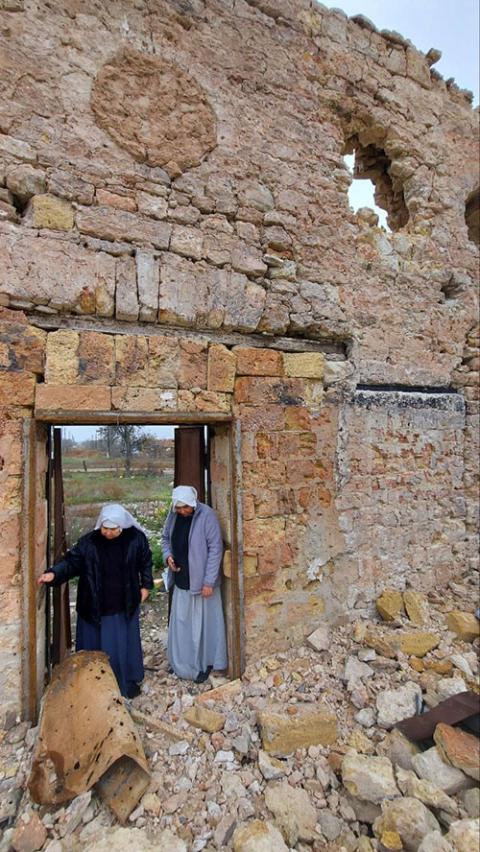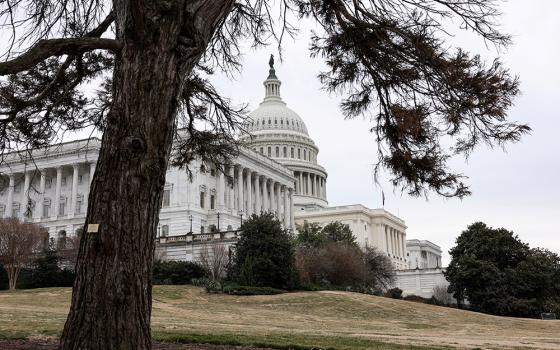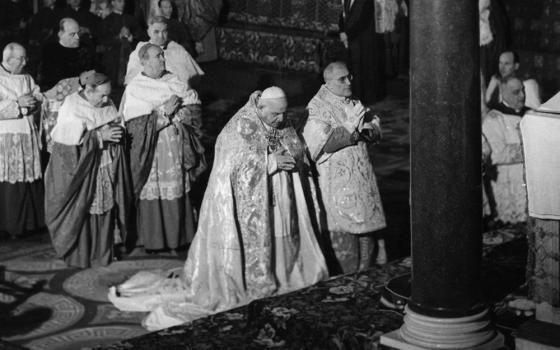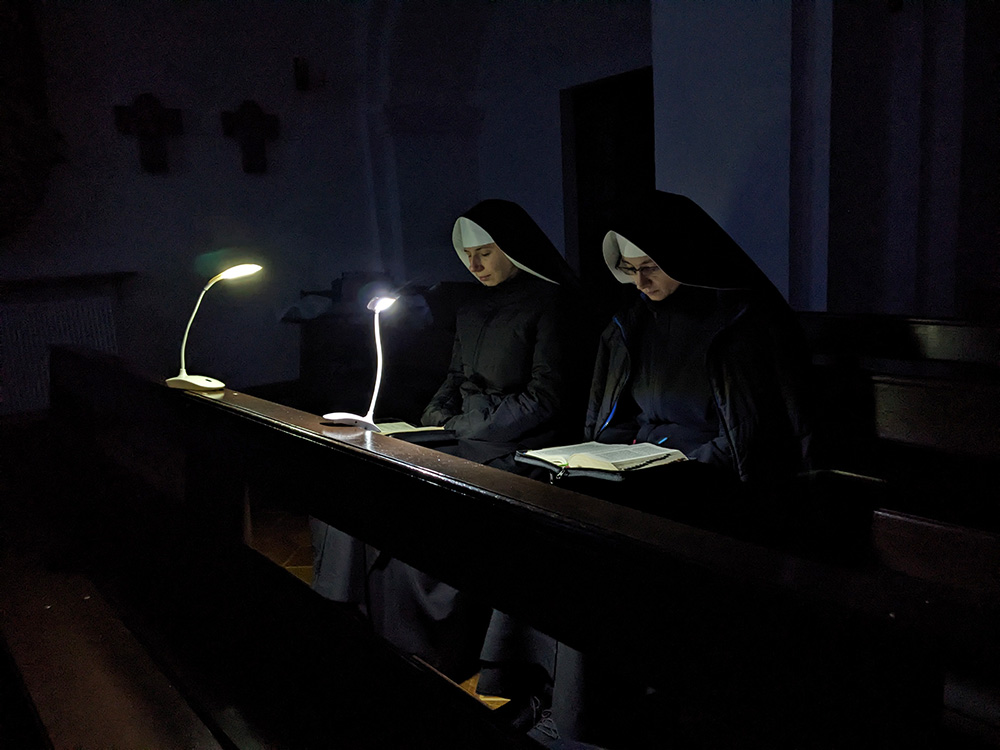
Sisters pray in the chapel of a Benedictine monastery in Ukraine when the lights are turned off. (Courtesy of Scholastica Oleksandra Hulivata)
Editor's note: Global Sisters Report's new series, Hope Amid Turmoil: Sisters in Conflict Areas, offers a look at the lives and ministries of women religious serving in dangerous places worldwide. The news stories, columns and Q&As in this series will include sisters in Ukraine, Nigeria, Kenya, Sri Lanka, Nicaragua and more throughout 2023.
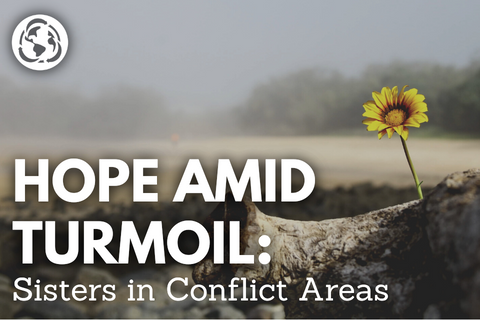
I don't remember what day Feb. 23, 2022, was. I can remember almost nothing: What was the weather like that day? What was my mood? What did I do, what were my plans? I just don't know. All memories were overshadowed by the next day — Feb. 24, which was etched in memory minute by minute.
Even today, I close my eyes and hear and see again all that ominous day brought. Now I divide my life into before and after. Sometimes I get the impression that in just one year — since the war has been going on — I have managed to live not one, but several lives.
Now, nothing would surprise me. War first stuns you with its cruelty and unpredictability, and then it takes away the ability to wonder. War takes everything away from you, and leaves you with many questions — questions that will haunt you for the rest of your life — and most will remain unanswered.
War is a difficult but invaluable experience. It taught us things that we would not have understood in peacetime.
In the news or in journalist's photos, you can see bloodied bodies, destroyed quarters of the city or even entire cities. However, there are also invisible traces of war: They are inside people, and these traces are imprinted on souls. How can we live after what has happened to us? And almost immediately the words of the Apostle Paul come to mind: And now these three remain: faith, hope and love. But the greatest of these is love (1 Corinthians 13:13). All we have left after Feb. 24 is faith, hope and love.
Lesson 1: Faith
Faith is something that cannot be taken away from us by Russian missile attacks, crimes against the civilian population, and terrorist acts. It is faith that tells us that suffering has meaning.
We look at the injustice of war every day and understand that anyone can become its victim - man or woman, child or elderly, rich or poor, celebrity or homeless. We are all equal before suffering and death.
However, we are not alone. When I look at the wounded or the dead, I see the suffering of Christ. He is present in every victim of war and suffers in each of us, in order to lead to eternal joy.
Recently, my 8-year-old student told me that her father died in the war and would soon be buried. With tears in my eyes, I began to comfort her and she said: "Don't cry. I know my dad was brave and not afraid of death. He wanted us to live in Ukraine and be free. And I want all people to know about my dad. Therefore, promise that you will tell everyone about him."
In the childlike faith of this girl, you can feel a strong conviction: Her father's death was not in vain and he will live forever in the hearts of the people he saved.
Lesson 2: Hope
For the first six months after the invasion, we received dozens or even hundreds of people in our monastery every day. These people had different stories, came from different cities, but they were all united by an indescribable desperation.
I will never forget their eyes full of pain and anxiety. They experienced the greatest fear when someone from the family remained under occupation or did not contact them for a long time. The pain doesn't lessen if you have to lose again and again.
Of course, people fleeing war needed shelter, food, and medicine — but above all they needed hope. They needed to hear that they were safe, that everything would be over soon, that there are people who will help them.
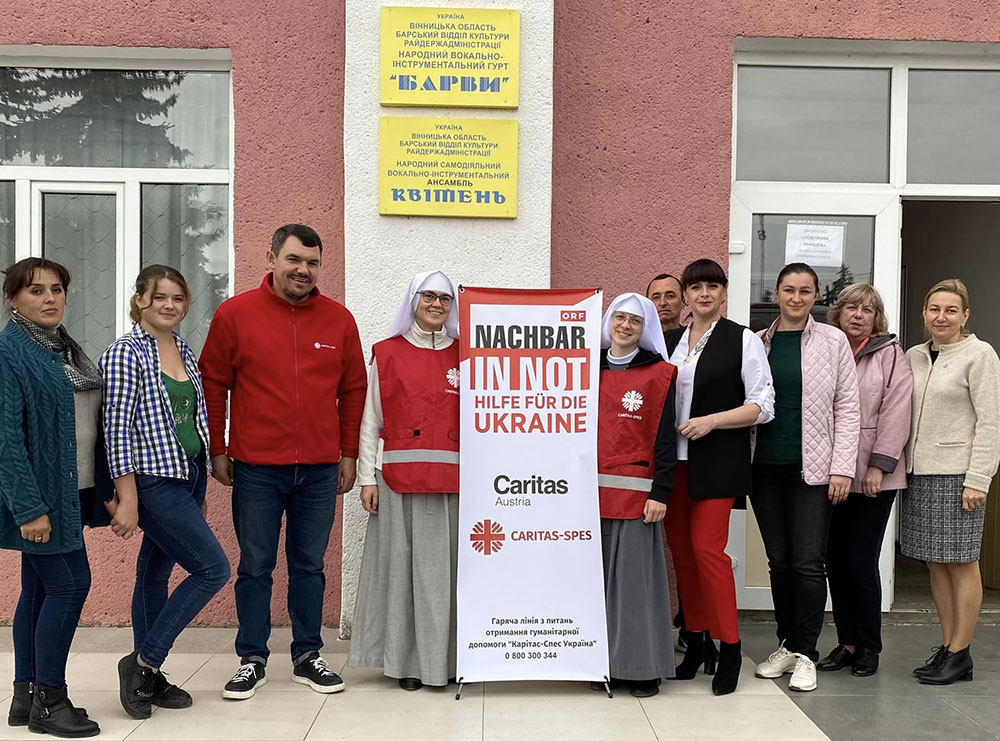
Sisters with volunteers from the Caritas charity foundation provide humanitarian aid to refugees in Ukraine. (Courtesy of Scholastica Oleksandra Hulivata)
War erases the future. But Christ — the One who rose after suffering and death — says: Do not let your hearts be troubled. You believe in God; believe also in me. My Father's house has many rooms. ... And if I go and prepare a place for you, I will come back and take you to be with me that you also may be where I am (John 14:1-3).
Every caring look or word can become a source of hope; you just need to dare to take on the pain of another person.
The slogan of one of the largest charitable foundations of Ukraine is eloquent: "Invincible when united." These words contain the whole truth about Ukraine today; our unity is a source of hope for a peaceful future.
Lesson 3: Love
My close friend, a soldier, was at the front from the first days of the war. From the beginning of March, he was in a city surrounded by Russians, to save the civilian population from murder, rape and other crimes of the Russian military. He realized that he would not get out of the encirclement alive, but continued to fight until his last breath.
One day, we managed to talk for a few minutes on a cellphone and he said: "I will do everything to ensure that my family and friends never experience what war is like."
He fulfilled his promise, did everything he could — he loved with the greatest love, and gave his life for his friends. Junior Sgt. Vyacheslav Kushnir died on Good Friday, April 15, 2022, in the city of Mariupol, while performing a combat mission.
The life of the military is often far from moral ideals, but they are an example for everyone — consecrated persons as well — with what love one should love one's brothers and sisters.
Advertisement
We are fighting an enemy that has come into our home to destroy it and enslave us all, as it was before. The Holodomor, endless repressions and bans, the destruction of identity — this is what millions of Ukrainians went through in that prison of nations — the Soviet Union. All these crimes are still alive in the memory of our grandparents and parents.
Today, we are witnessing new crimes, which we must stop once and for all. The legendary Ukrainian military leader and statesman Roman Shukhevych said: "We fight not because we hate those in front of us, but because we love those behind us."
The war destroyed the life of every Ukrainian, without exception. The war destroyed the world in which we lived until Feb. 24, 2022.
Each of us feels the burning pain of losing family and friends at the front, fear 24 hours a day and seven days a week; discomfort from lack of light, heat, hot water; endless queues at shops, hospitals and pharmacies.
But the most important thing is that each of us feels a thirst for struggle, each of us has become a warrior of truth and goodness on our front. Another important lesson of war is: "Be where you are. Do what you do best." Not only the military, but priests, doctors, teachers, businessmen and artists are doing everything they can to bring our common victory closer.
The world can join our struggle today through prayer and moral or financial support for Ukraine.

